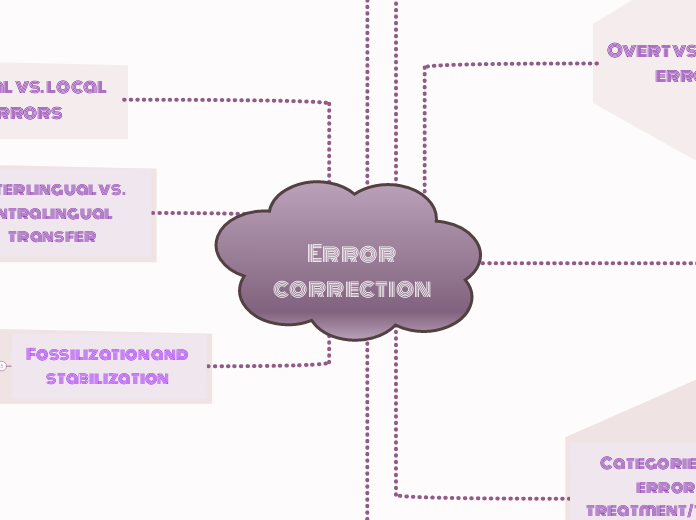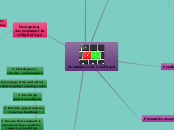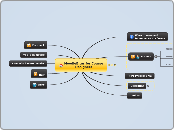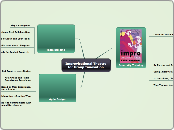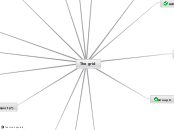Error correction
Tenses demonstrate the time of actions centered around the subject of the sentence. These actions are called verbs and change according to tenses.
Fossilization and stabilization
Stabilization
Stabilization indicates that the student has reached a point where language errors are minimized, and their linguistic performance becomes more accurate and natural. It signifies a significant milestone in language learning, showcasing the learner's ability to use the language with increased fluency and confidence.
Fossilization
These errors persist even in advanced stages of language learning, often resisting correction.
Fossilization is a phenomenon in language acquisition where students reach a point where certain grammatical or linguistic errors become deeply ingrained in their writing, even with their ongoing efforts to improve.
Interlingual vs. Intralingual transfer
Intralingual transfer
Intralingual transfer refers to the influence of a person's existing knowledge within a second language on their language learning process. This transfer can result in improved comprehension or errors due to oversimplification. Recognizing intralingual transfer aids students and teachers in understanding how prior language experiences impact learning outcomes.
Interlingual transfer
Interlingual transfer is the influence of a person's native language on their second language acquisition. It involves both positive similarities aiding accuracy and negative differences leading to errors. Recognizing this transfer helps learners and educators understand challenges and improve language acquisition.
Global vs. local errors
There are four Future tenses:
- Future Simple ('with Will' and 'with Going to')
- Future Continuous
- Future Perfect Simple
- Future Perfect Continuous
Local Errors
Future Perfect Simple is used for:
- an action that will continue up until a point in the future
- an action that finishes just before another time or action in the future
Some adverbs used with Past Perfect Continuous for future actions:
- for
- since
- next week
- next month
- next year
Local errors are minor mistakes made by students that typically involve specific details such as grammar, vocabulary, or pronunciation. These errors don't necessarily disrupt overall communication but might affect accuracy or clarity.
Structure:
Will + Subject + Have Been + Verb-ING
e.g. How long will they be working on that project next week?
Global Errors
Future Perfect Simple is used for:
- an action that will be finished by a particular time in the future
- an action that starts before and continues up to another action or time in the future
- an action that will finish before a certain time in the future, but it is not known exactly when
Adverb used with Future Continuous:
- tomorrow (e.g. tomorrow by 7)
Global errors refer to significant and overarching mistakes made by students that affect communication or comprehension. These errors can involve incorrect sentence structures, misuse of verb tenses, or flawed word choices. Global errors hinder effective communication and comprehension, highlighting areas requiring focused improvement in language proficiency.
Structure:
Subject + Will Have + Past Participle
e.g. I will have met my friend form United States by this time tomorrow.
Categories of errors
Ordering
I may go to the bathroom?
Ordering is a category of error that pertains to the incorrect arrangement of words, phrases, or clauses in spoken or written language.
Substitution
Substitution is a category when a language student replaces one element with another in speech or writing. This type of error involves using incorrect words, phrases, or grammatical structures that may not convey the intended meaning accurately. Substitutions can arise from limited vocabulary, confusion of similar-sounding words.
Omission
I
Omission is a category of error within language learning where students unintentionally leave out essential elements from their speech or writing. This error involves excluding words, phrases, or information that are necessary for conveying a complete and coherent message. Omissions can occur due to factors like incomplete grammar knowledge, hasty communication, or a lack of vocabulary.
Addition
Addition is where a language user includes extra or unnecessary elements in their speech or writing. This type of error involves the inadvertent inclusion of words, phrases, or information that do not contribute to the intended meaning or may even disrupt the overall coherence and clarity of the communication.
Categories of error treatment/types of feedback
Repetition
Repetition is a technique and communication strategy employed in language learning and teaching. It involves the deliberate reiteration of words, phrases, or sentences. Repetition serves various purposes, such as reinforcing vocabulary, grammar, and memory retention.
Explicit correction
Elicitation
Elicitation is a technique employed in language instruction and communication contexts where teachers intentionally prompt and encourage a response from students. This technique aims to draw out specific information, knowledge, or language usage from individuals. Elicitation serves as a strategic method to stimulate active engagement, critical thinking, and linguistic expression, fostering a deeper understanding of the subject matter and enhancing language acquisition and effective communication skills.
Metalingüstic feedback
Metalinguistic feedback refers to a type of feedback provided in language learning scenarios where individuals receive guidance and commentary on various aspects of their language use. Unlike direct correction, metalinguistic feedback involves explicit discussions about grammar, vocabulary, syntax, and other linguistic elements.
clarification request
The concept of a "clarification request" encompasses various dimensions. As an error category, it materializes when a speaker seeks further explanation due to misunderstanding or ambiguity in communication. In language learning, as a type of feedback, it enables listeners to solicit additional information from speakers, ultimately enhancing mutual understanding by facilitating the provision of contextual details, further enriching the discourse.
Recast
Recast as a Type of Feedback encompasses instances where a teacher or mentor responds to a student's statement by restating it with proper grammar or vocabulary. Recasts offer learners a non-intrusive way to identify and rectify errors while engaging in meaningful communication.
Recast as an Error Category can be classified as an error category. It involves instances where a language learner's statement is reformulated by an interlocutor to correct grammar, vocabulary, or syntax errors without explicitly pointing out the mistake. it provides learners with implicit correction, helping them internalize the proper language structure through exposure to the corrected version.
Overt vs. Covert errors
There are four Past tenses:
- Past Simple
- Past Continuous
- Past Perfect Simple
- Past Perfect Continuous
Covert errors
Past Perfect Continuous is used:
- for an action that started in the past and continued up to another point in the past
- to show cause and effect
Some adverbs used with Past Perfect Continuous:
- since (e.g. since yesterday)
- for (e.g. for 10 years, for 6 months)
Covert errors might indicate a more complex issue in the learner's understanding of the language rules and require careful analysis to identify and correct.
Structure:
Had + Subject + been Verb-ING?
e.g. How long had they been living in London before moving here?
Covert errors are errors that are not readily noticeable or obvious, either to the learner or to others.
Structure:
Subject + hadn’t been/had not been + Verb-ING
e.g. I was tired because I hadn't been sleeping.
Overt
Past Perfect Simple is used for:
- an action that began in the past and is still going on at the moment of speaking
- an action that continued before and after another action
- a change of mind
- an action happening repeatedly in the past
The Past Perfect tense is not normally used alone. It is used to denote the earlier of two past actions. We use Past Simple for the latter action.
Some adverbs used with Past Perfect Simple:
- already, before, ever, never
- once, twice, yet
- just, up to then
- for, since
Overt errors are errors that are noticeable and obvious to both the learner and the listener or observer. These errors are often easily detectable and can be recognized by the learner as mistakes in their language use.
Structure:
Subject + had + Past Participle
e.g. They had already met Julia before the party.
Overt errors may result from lapses in attention, memory, or application of rules. Learners can often correct overt errors on their own once they become aware of them.
Structure:
Had + Subject + Past Participle?
e.g. Had they met Sarah before the party?
Mistakes vs. errors
There are four Present tenses:
- Present Simple
- Present Continuous
- Present Perfect
- Present Perfect Continuous
Errors
Present Perfect Continuous is used:
- to describe an action that started in the past and has continued up to the present
- to describe an action that has just finished
Some adverbs used with Present Perfect Continuous:
- always
- only
- never
- ever
- still
- just
Errors indicate gaps in the learner's language competence and may require more focused attention and learning to rectify. They can be classified into grammatical, lexical, and pronunciation errors.
Structure:
Subject + have/ has been + Verb-ING
e.g. They have been learning French for two years.
Examples
Type in your own examples or you can also choose from the examples below.
Form of verb 'to be':
I have been beingYou have been beingHe/She/It has been beingWe have been beingYou have been beingThey have been being
Form of verb 'to have':
I have been havingYou have been havingHe/She/It has been havingWe have been havingYou have been havingThey have been having
Errors are systematic deviations from the norms of a language and often occur due to a lack of knowledge or misunderstanding of the rules.
Structure:
Have/ has + Subject + been Verb-ING?
e.g. How long has he been learning German?
Mistakes
Present Perfect is used for:
- an action that occurred at a time which is indefinite and has its effect on the subject
- an action that occurred many times and has the possibility to occur in the present/future
- an action that began in the past and is still going on in the present
Some adverbs used with Present Perfect:
- just
- already
- yet
- for
- never/ever
- up to now
Mistakes can vary in severity and might not consistently reflect the learner's overall language competence. Learners are generally capable of recognizing and correcting their mistakes once they are pointed out.
Structure:
Subject + have/ has + Past Participle (3rd Form of the Verb)
e.g. She has finished the letter.
Mistakes are unintentional errors in language use that occur due to lapses in attention, or other cognitive factors. They usually happen when a learner knows the correct rule but fails to apply it correctly in a specific instance.
Structure:
Have/ has +Subject+ Past Participle?
e.g. Has she finished the letter?
Additional info
